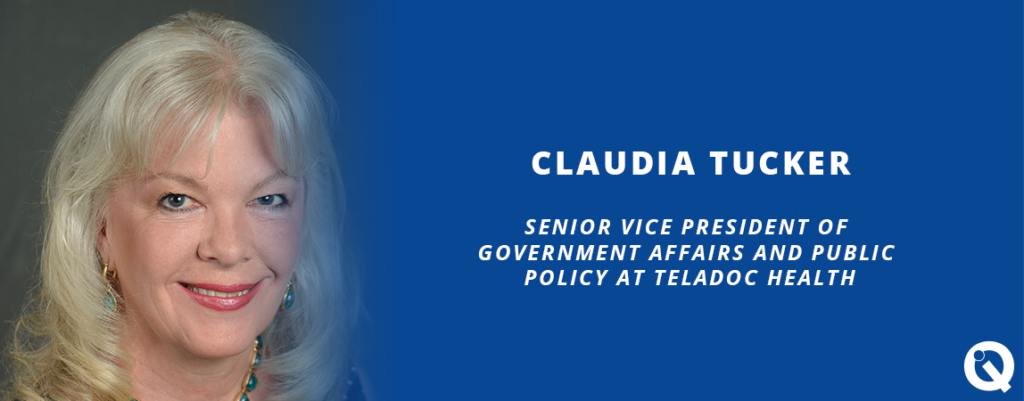Claudia Tucker is Senior Vice President of Government Affairs and Public Policy at Teladoc Health. Teladoc Health is a member of the Quality Institute’s Professional & Technology Council.
During the COVID-19 pandemic, we saw the use of telehealth increase substantially. But access was not equal. What does digital health equality mean to you?
Let me start by saying that I live in very rural Virginia, near Appalachia. We know disparities did not just start this year. They have been around for a long, long time. During the pandemic there has been greater awareness of these disparities and a passion to address them. Telehealth is a great social equalizer. You can get access to the same quality care if you live in rural Montana or in suburban New Jersey. It has been a game changer. But not for everyone. If you are not technologically savvy, or don’t have access to a computer or Wi-Fi, you don’t have digital equity. There’s a difference in access because of race and among age groups. And so what we have been doing all along is to make sure that people are not left behind. We saw greater disparities before federal and state governments removed barriers to using telehealth from your landline or cell phone. You shouldn’t be denied access to virtual care simply because of where you live or what technology you have.
How do Teladoc and its partners support patients who may have a harder time using or accessing telehealth services, such as older adults, or people without broadband or the right equipment?
It starts with educating legislators and other policy makers at the state and federal level about what needs to be done to remove any barriers created by outdated statutes. I can say that New Jersey has been a leader here. The legislature has been very open and pragmatic in approaching this and removing those barriers.
Things like the recognition of asynchronous technologies that allow people to connect at each person’s own convenience and schedule. This means being able to use asynchronous technologies like a blood pressure cuff or glucose monitor at home and having that data fed to a provider who can review at another time and then call and say, “Hey, have you taken your meds? When’s the last time you ate?” We’re also advocating for programs such as the Federal Communication Commission’s COVID-19 Telehealth Program that improve access to innovative digital health tools that can bring this kind of high-quality care into the home of more Americans.
You were recently named Policy Council Chair for the American Telemedicine Association. What are your 2021 priorities?
The council includes representatives from companies that manufacture medical devices, hospital systems, companies like Teladoc Health and others, and telecommunications companies. It’s any entity that could be remotely involved in Telehealth.
We thought, “What makes good policy?” We all worked together to come up with something that we could agree on. Now we are reviewing that policy. We will look at it through the lens of: “What does this do to promote equitable access to care for all? What does this do to diminish the digital divide?” We’ve got a lot of different entities here with different perspectives. We’re working for one goal and that’s to promote good telehealth policy.
Regarding telehealth, what changes during the pandemic do you think should be preserved?
When the pandemic struck last March, Teladoc Health worked feverishly to make sure that all the physicians in our network could be deployed where they were needed. The Administration and Congress, at the time, were trying to figure out how to get enough doctors licensed to an area where there was a hotspot. The administration quickly learned that they didn’t have the ability or the authority to go to the state medical boards and waive licensure. And so we worked with governors — and just about every state in the country, in some form or fashion, waived the licensure requirement. I am proud to say that the industry stepped up, and Teladoc Health was a leader in that process. And physician practices adapted very quickly and incorporated virtual care into their business model. Hospital systems did the same thing. I don’t think we will ever see this country go back. The ability to receive quality treatment from your home is life changing.
I want to add that during the pandemic the Federal Government allowed for the HIPAA requirements to be waived. And it was the right thing to do at the right time. But as we look forward, and as we start going through this in a very methodical, very pragmatic, way, we need to make sure that we’ve got safeguards in place to protect patient safety and privacy.
We also like to ask people a question about their lives outside of work. What might we see you doing on a day off?
I am passionate about my job and spend a lot of my time off working. I also live on a farm, a seventh-generation cattle farm, that is run by my husband and a great team. Our home, Forest Hill, is on the National Historic Register and we’ve been renovating that for years. I love gardening, being outdoors, and spending time with my grown children who come home to visit. I’m also an elected official here and thoroughly enjoy my work as one of the first women on the Amherst County Board of Supervisors.

